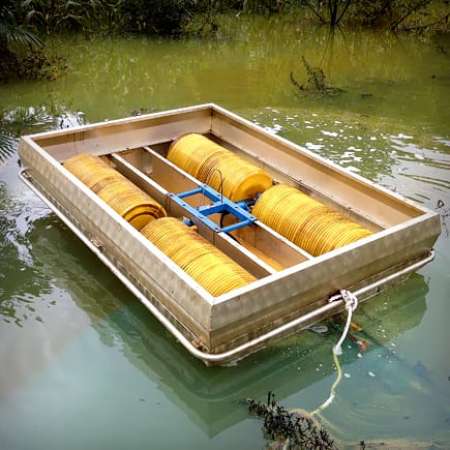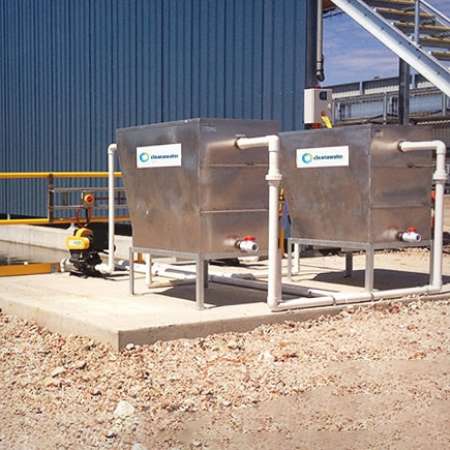Managing your commercial wastewater in NSW
Everything you need to know about Sydney wastewater treatment
In New South Wales, businesses across industries must adhere to strict wastewater treatment regulations. From protecting the state’s waterways to ensuring public health, managing wastewater responsibly is crucial. It isn’t simply a matter of diverting your commercial or industrial business’s waste to a wastewater treatment facility — you may need to have an onsite system to meet state requirements.
Whether you’re a small business owner or running a large industrial operation, understanding these requirements is essential to avoid penalties and promote sustainable practices.
In this guide, we’ll cover:
For more details on how we can help your business stay compliant, check out our customisable water treatment systems.
Wastewater treatment is essential for all NSW industries
Proper wastewater treatment is more than just a legal requirement in NSW—it’s a vital step in safeguarding the environment and public health. Here’s why it matters:
Environmental preservation
-
Protecting waterways and ecosystems: NSW is home to a diverse range of waterways, from Sydney Harbour to regional rivers and wetlands. Proper wastewater treatment prevents harmful contaminants from polluting these ecosystems.
-
Reducing pollution: Untreated wastewater contains pollutants like chemicals, heavy metals, and organic matter that can harm aquatic life and disrupt natural habitats.
Public health and safety
-
Minimising health risks: Untreated wastewater can contain pathogens and toxins that pose serious risks to public health.
-
Preventing waterborne diseases: Effective wastewater treatment reduces the spread of illnesses caused by contaminated water.
Regulatory compliance
-
Avoiding fines and penalties: Non-compliance with NSW wastewater regulations can result in significant financial penalties.
-
Ensuring business continuity: Meeting wastewater treatment requirements helps businesses avoid operational disruptions due to regulatory enforcement.
Key wastewater treatment requirements in NSW
Adhering to wastewater treatment regulations is non-negotiable for businesses operating in New South Wales. These regulations are designed to protect the environment, public health, and the integrity of the state’s water infrastructure. Failing to comply can result in steep fines, operational disruptions, or even legal action. Here’s what you need to know:
What are the requirements for commercial wastewater management in NSW?
The NSW Department provides detailed guidelines for managing trade wastewater. Here's a breakdown of the key points:
Managing commercial wastewater isn’t just about ticking regulatory boxes—it’s about safeguarding the environment, ensuring council worker safety, and protecting vital sewerage infrastructure. Poorly managed discharges can lead to significant issues, including corrosion of infrastructure, unpleasant odours, and even worker injuries.
If your business plans to discharge trade wastewater into the sewer system, you must first secure approval from your local water utility. Before any wastewater is released, it must undergo pre-treatment to meet the specific standards set by the council.
Councils play a pivotal role in trade wastewater management. They establish acceptance standards, adopt a risk-based management approach, and oversee applications for trade wastewater discharge. Additionally, they monitor businesses to ensure ongoing compliance. Wastewater discharge charges are calculated based on the volume and pollutant concentration of the waste.
Trade wastewater risk categories
Trade wastewater is classified into categories based on its risk to the sewerage system:
-
Category 1: Low risk, requiring little to no pre-treatment with minimal impact on the sewer system.
-
Category 2: Requires prescribed pre-treatment to remove specific pollutants.
-
Category 2S: Applies to a septic tank, larger septic system, or pan-content waste discharges.
-
Category 3: Covers large discharges (over 20 kL per day) and industrial wastewater, posing the highest risk.
Practical strategies for improving trade wastewater
Businesses are encouraged to adopt proactive strategies to reduce and improve their wastewater discharges. These include:
-
Using water efficiently: Minimise water use to reduce wastewater volume.
-
Preventing contaminants at the source: Keep pollutants like oils, grease, and solids out of the wastewater stream.
-
Installing screens and basket arrestors: These simple tools help capture solid waste before it enters wastewater systems.
-
Using grease traps: Essential for industries like hospitality, where fats and oils are common pollutants.
By improving wastewater quality and reducing volume, businesses not only lower their trade waste charges but also reduce the strain on their local wastewater treatment plant—ultimately contributing to a healthier environment.
NSW wastewater testing and reporting requirements
Regular testing is critical for demonstrating compliance. Businesses must:
-
Conduct sampling of their wastewater at specified intervals.
-
Submit test results and compliance reports to relevant authorities.
-
Address any exceedances promptly by implementing corrective actions.
By staying on top of these requirements, businesses can avoid fines, protect the environment, and maintain smooth operations.
The wastewater treatment process in NSW
Wastewater treatment is a multi-stage process designed to remove contaminants and ensure water is safe for reuse or discharge into the environment. In New South Wales, this process is rigorously controlled to protect both public health and natural ecosystems.
Wastewater treatment stages
Each stage of wastewater treatment plays a crucial role in removing different types of pollutants:
-
Primary treatment:
-
Purpose: Removes large solids and floating materials.
-
Process: Wastewater flows through sedimentation tanks where heavier particles settle, and skimmers remove grease and oils.
-
Secondary treatment:
-
Purpose: Breaks down organic matter using biological processes.
-
Process: Aerated wastewater treatment systems and biological filters introduce microorganisms that consume organic pollutants, significantly reducing biological oxygen demand (BOD) and chemical oxygen demand (COD).
-
Tertiary treatment:
-
Purpose: Provides advanced filtration and disinfection to remove remaining contaminants.
-
Process: Methods such as UV disinfection, membrane filtration, or chemical treatments like chlorination ensure the final effluent is safe for discharge or reuse.
How a wastewater treatment facility operates
Facilities across NSW, including major Sydney wastewater treatment plants like Malabar and North Head, handle millions of litres of wastewater daily. These facilities play a vital role in:
-
Managing urban wastewater: Treating water from residential, commercial, and industrial sources.
-
Protecting the environment: Ensuring treated wastewater meets stringent discharge standards to prevent pollution of rivers, oceans, and other water bodies.
NSW-specific wastewater challenges
The diverse landscape and population density in NSW presents unique challenges:
-
Urban areas: High volumes of wastewater from densely populated regions like Sydney require efficient, large-scale treatment solutions.
-
Regional and rural areas: Smaller, decentralised treatment systems must cater to local communities while managing varied waste types, including agricultural runoff.
By understanding the intricacies of the wastewater treatment process, businesses can better appreciate the importance of compliance and the role they play in protecting NSW’s valuable water resources.
Additionally, local water utilities play a crucial role in these areas by providing tailored wastewater management services to address specific regional needs. From monitoring discharge limits to offering technical guidance, these utilities ensure that businesses maintain compliance across the state.
Choosing the right wastewater treatment system for your business
When it comes to wastewater management, there’s no one-size-fits-all solution. At Cleanawater, we design systems tailored to meet the unique needs of your business. Whether you’re dealing with high volumes of trade waste, seeking to reduce water usage, or aiming to meet specific regulatory requirements, we’ve got you covered.
Water recycling systems
Recycled water is not only cost-effective but also environmentally responsible. Our water recycling systems help businesses:
-
Reuse treated water for various applications, reducing overall consumption.
-
Cut costs on water bills and disposal fees.
-
Meet sustainability goals, appealing to eco-conscious clients.
Explore our water recycling systems to see how they can benefit your business.
Rainwater and stormwater harvesting systems
Maximise natural resources with our innovative rainwater and stormwater harvesting solutions. These systems allow businesses to:
-
Capture and store rainwater for non-potable uses such as irrigation or equipment washing.
-
Reduce stormwater runoff, minimising flood risks and environmental impact.
Learn more about our rainwater and stormwater harvesting systems.
Advanced water treatment systems
For industries generating highly contaminated wastewater, our advanced water treatment systems provide the necessary pre-treatment to meet compliance standards. These systems:
-
Effectively remove contaminants, including heavy metals and hydrocarbons.
-
Ensure discharge meets strict regulatory limits, protecting both the environment and your business.
Discover our water treatment systems.
pH control systems
Maintaining the right pH level is crucial for businesses discharging wastewater. Our pH control systems:
-
Automatically adjust pH levels in wastewater, ensuring compliance with local water authority standards.
-
Offer dual treatment capabilities, handling both acidic and alkaline waste streams.
Find out more about our pH control systems.
Oil-water separators
Industries ranging from workshops to large-scale manufacturing facilities rely on oil-water separators to manage hydrocarbon-contaminated wastewater. These systems:
-
Efficiently remove oils and hydrocarbons: Designed to reduce oil content to as low as 5 ppm.
-
Use coalescing technology: Coalescing plates or media help oil droplets combine and rise to the surface for easy removal.
-
Simplify waste disposal: Separated oil is skimmed off and disposed of by licensed waste contractors, while clean water is discharged into the sewer system.
Learn more about how our oil-water separators can streamline your wastewater management.
Wash bays
Wash bays cater to industries cleaning everything from construction vehicles to small workshop tools. These systems can be tailored as:
-
Permanent or portable units: Adaptable to your site’s needs, offering flexibility for fixed or mobile operations.
-
Integrated sand filtration: Captures solids and debris from the wastewater stream.
-
Advanced treatment options: Depending on the contaminants, additional systems like oil-water separators may be required to meet compliance standards.
Explore our range of vehicle wash bays designed for comprehensive wastewater management.
Pump stations
Pump stations are a critical component for sites with challenging topography or wastewater flow needs. These systems:
-
Ensure efficient water flow: Overcome gravity limitations by pumping wastewater to treatment systems or sewers.
-
Prevent environmental contamination: Control wastewater discharge to comply with environmental regulations.
-
Provide tailored solutions: Suitable for a range of industries, ensuring reliable wastewater transport.
Find out how our pump stations can optimise your site’s wastewater flow.
Chemical dosing systems
Chemical dosing systems provide targeted solutions for businesses managing unique wastewater challenges. These systems:
-
Control pH levels: Maintain optimal pH balance to meet discharge regulations.
-
Disinfect and treat wastewater: Add chemicals like chlorine to neutralise harmful pathogens or pollutants.
-
Offer customisation: Dosing systems are designed based on the specific contaminants in your wastewater stream.
Consult with our specialists to determine the best chemical dosing system for your business needs.
How Cleanawater helps businesses meet wastewater treatment requirements in NSW
Navigating wastewater regulations in New South Wales can be complex, but Cleanawater is here to simplify the process. Over the past two decades, we’ve worked with businesses across industries—from hospitality to heavy industry—providing solutions tailored to their specific wastewater challenges.
Our team understands that no two businesses are alike. Whether you’re running a vehicle wash bay in Sydney’s west or managing a manufacturing plant in Newcastle, we’ll help you stay compliant and efficient.
Here’s what we offer:
-
Custom wastewater treatment systems: Our systems are designed to meet your business’s unique needs. From water recycling to pH control, we offer solutions that ensure compliance with EPA and local water authority standards.
-
End-to-end regulatory support: From initial consultations to securing Sydney Water trade waste agreements, we streamline the compliance process so you can focus on running your business.
-
Expert maintenance and monitoring: Our ongoing support includes regular system checks, troubleshooting, and updates to keep your wastewater treatment system running at peak performance.
Wastewater compliance is crucial, but it doesn’t have to be overwhelming. Partner with Cleanawater, and let us help you achieve sustainable, efficient, and regulation-compliant wastewater management.
Explore our wastewater treatment solutions or contact us today for expert advice and tailored systems.
Must Read
What to Expect During a Modular Wash Bay Installation
CleanaWater, we make the process of installing a modular wash bay on your site as smooth and straightforward as possible. ...
Read moreThe CleanaWater Team Driving Water Treatment and Sustainability
CleanaWater is powered by a dedicated team of professionals who bring expertise and passion to every project. ...
Read more